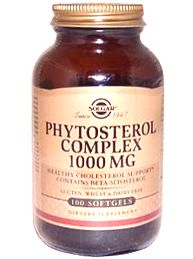Phytosterol

Phytosterols also known as plant sterols are a group of steroid alcohols naturally occuring in plants. It is a solid, unsaturated fat found in the fatty tissues of plant or basically plant cholesterol. One such phytosterol complex made up of beta-sitosterol, campesterol, stigmaseterol and brassicasterol is isolated from vegetable oil and marketed as a dietary supplement and to reduce cholesterol.
The human body needs cholesterol for various metabolic processes and for the formation of cell membranes. It produces cholesterol in the liver. Certain foods also have cholesterol which is imbibed by the body. This excess cholesterol is deposited on the arterial walls by the low density lipoproteins (LDL) leading to atherosclerosis. Phytosterols help by reducing the production and absorption of bad cholesterol.
Phytosterols act as control agents to regulate cholesterol levels. Certain cells in the body metabolize and use the cholesterol for bodily functions. Dietary cholesterol combines with bile salts so that it can be absorbed by the intestine. There it is reassembled into lipoproteins which transport it to the liver. Phytosterols act directly on the digestive system and block the absorption of cholesterol by as much as 40%. The reduced amount of cholesterol reaching the liver increases the clearing of existing LDL particles leaving less LDL circulating in the blood stream. People with a largely vegetarian plant based diet therefore have low cholesterol levels.
Besides decreasing cholesterol absorption, phytosterols also have other mechanisms to protect the health of the heart. The Food and Drug Administration has stated that a diet of 0.8g of phytosterols per day can reduce the risk of cardiovascular disease and bring down cholesterol levels by 10 to 15%. Besides this, the beta-sitosterol reduces symptoms of an enlarged prostrate and brings down joint inflammations.
Foods containing phytosterols
Phytosterols are found largely in rice bran, corn, flax seed and wheat germ. Nuts, legumes, oranges, bananas, beetroot and brussel sprouts also have good concentrations of phytosterols. If the cholesterol level is in the normal range, regular diet containing these foods is sufficient to keep the cholesterol under check. They have been included in many breakfast cereals, oils and butter substitutes to provide additional intake for high cholesterol patients.
The Upside
• Phytosterols do not interfere with the high density lipoprotein (HDL) or good cholesterol levels.
• They do not produce any of the statin side effects like muscle or joint pain.
• They do not harm the liver or kidney.
The Downside
• Phytosterol taken in recommeded doses takes a long time to show considerable results.
• People with obesity or overweight problems must be careful to take a low-fat diet enriched with phytosterols.
• It cannot be used for people with high cholesterol readings. It must be combined with other ingredients or with statins to get a syngeric effect.
Phytosterols ARE an important breakthrough in the human struggle against cholesterol control. Taken in the right dose alongwith a disciplined life-style, proper diet and regular exercise, phytosterol can be all you need to lower and maintain your cholesterol.
0 Comments:
Post a Comment